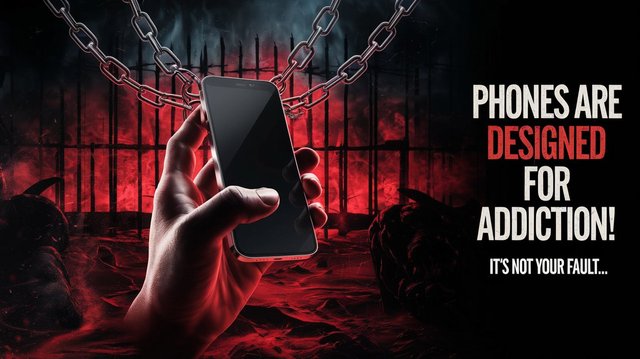The problem is not in you... Smartphones are designed to make you addicted.

Why Are We Addicted to Our Smartphones?
What’s the first thing you do when you wake up? And the last thing before going to sleep? For many of us, the answer is simple: we check our phones.
Smartphones have become a constant companion. Some people can’t imagine going a single hour without checking their device. Leaving the phone at home can even cause anxiety and a sense of loss — as if something essential is missing.
Even after making promises to reduce screen time, we often fall right back into scrolling within minutes. This isn’t a rare problem; it's global. As of 2020, more than 3.5 billion people owned smartphones, and studies show that nearly 45% of young users are addicted.
But what exactly makes smartphones so addictive?
It's All by Design
Smartphones are more than just tools. They're carefully engineered to keep us hooked. Behind every app is a team of developers, psychologists, and designers whose main goal is to grab your attention — and keep it.
Infinite scrolling, constant notifications, and personalized content aren't coincidences. These features are designed to create habits and routines that make users return again and again.
The more time we spend on our phones, the more profit companies make. It’s not personal; it’s just business. But the effects on our mental focus, productivity, and overall well-being can be serious.
A Silent Invasion
Unlike TV or radio, smartphones are portable and deeply integrated into every part of our lives. They're with us at the dinner table, on public transport, at work, and even in bed. The line between real life and screen life is slowly disappearing.
Perhaps even more telling: Many tech industry leaders limit or even ban smartphone use for their children. Steve Jobs and Bill Gates, for example, were known to set strict limits on screen time at home. If the creators of these technologies are cautious, shouldn't we be too?
The Brain on Smartphones
Addiction isn’t only about substances like alcohol or drugs. Behavioral addiction is real, especially when certain actions trigger the release of chemicals like dopamine in the brain.
Using a smartphone, getting likes, or receiving messages can cause short bursts of pleasure — which makes us want to repeat the action. Over time, this creates a cycle that’s hard to break. Some people even experience withdrawal symptoms when they’re without their phone.
What Can We Do?
If you feel like your phone is taking over your time and focus, here are a few practical steps:
- Turn off unnecessary notifications – Only allow alerts for messages or calls that truly matter.
- Delete time-wasting apps – If an app doesn’t serve a real purpose or adds no value, consider removing it.
- Set usage limits – Use built-in tools like Screen Time (iOS) or Digital Wellbeing (Android) to track and reduce your usage.
- Create phone-free zones – Try keeping your phone out of reach during meals, work hours, or when spending time with others.
- Charge your phone away from your bed – This can help improve your sleep quality and reduce nighttime scrolling.
Conclusion
Recognizing the problem is the first step toward taking back control. Smartphones are powerful tools, but they shouldn’t control our lives. By becoming more aware of how we use them, we can regain our focus, protect our mental health, and enjoy a more balanced life — both online and offline.
“Are you really addicted to your mobile phone or not? Drop your thoughts below 👇”